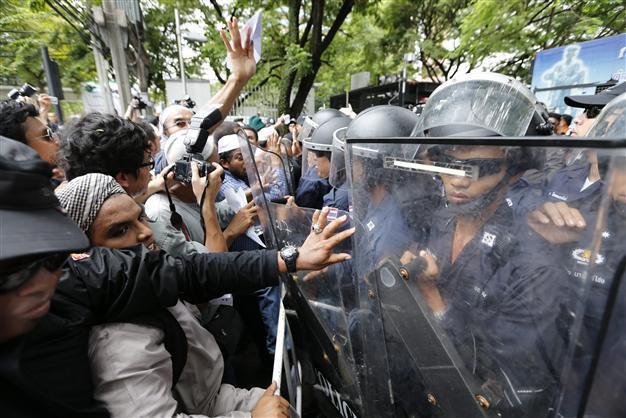Thai Muslims in film protest at US embassy, Google
BANGKOK - Agence France-Presse

About 250 Thai Sunni Muslim demonstrators push against police guarding the United States embassy grounds, in Bangkok, Thailand, 27 September 2012. EPA photo
Several hundred Muslims, many waving banners and shouting "execute people who mock Islam", rallied outside the US embassy and Google offices in Bangkok Thursday to denounce an anti-Islam film that has sparked global protests.The demonstration saw a brief scuffle as protesters tried to surge towards the United States embassy through lines of riot officers, but police said it passed largely peacefully with no one seriously injured.
Around 300 people took part in the rally, the latest in a wave of protests against a low-budget film entitled "Innocence of Muslims", believed to have been produced by a small group of extremist Christians in the United States.
Addressing the crowd of mostly men from the back of a pick-up truck outside the consulate in Bangkok's business district, one organiser asked in Thai: "What will we do with the Jewish, Christians and Americans if we see them?". He was met with cries of "Kill them!" A procession of demonstrators later petitioned Internet giant Google, asking the company to ban the film, which was hosted on its video sharing site YouTube.
"I acknowledge that this is an important issue," said Google Thailand representative Peter Fretten, who met the group and spoke to them in Thai, offering to forward the protesters' concerns to the company's headquarters.
Violence triggered by the film, which mocks the Prophet Mohammed, has claimed around 50 lives, including that of the US ambassador to Libya.
The US embassy, which closed for a previous similar demonstration last week, stayed open to the public on Thursday.
Buddhist-majority Thailand has about 1.2 million Muslims -- about four percent of the population -- according to the latest available data, many living in the country's southern states near the Malaysian border.
















